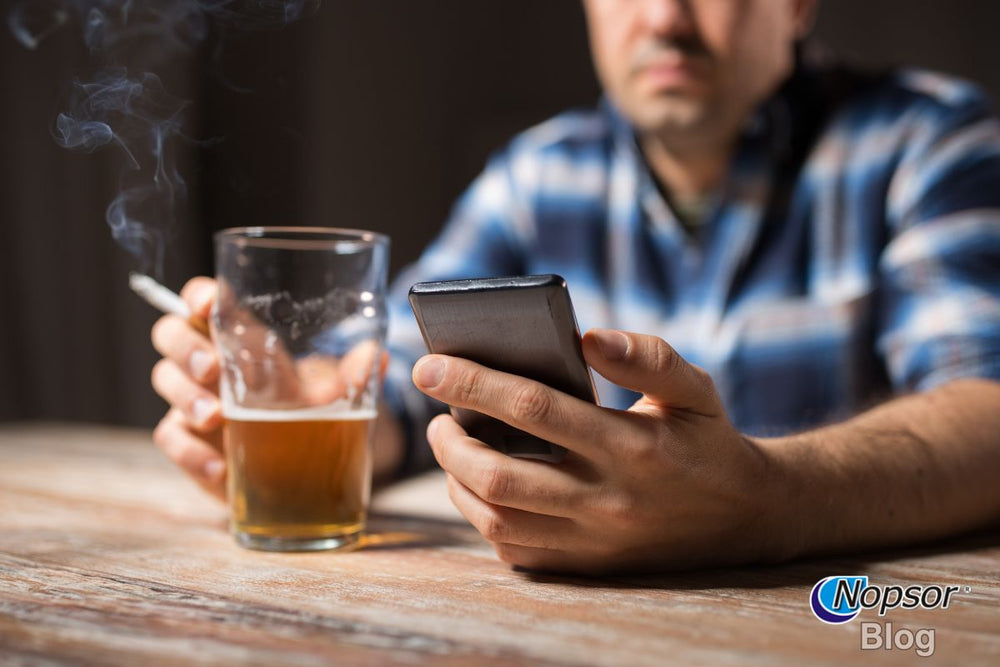How Alcohol and Smoking Can Affect Psoriasis Symptoms

Understanding the Link Between Psoriasis, Alcohol, and Smoking
Psoriasis is a chronic autoimmune condition that speeds up skin cell production, leading to red, inflamed, and scaly patches. While genetics play a role in psoriasis, lifestyle choices like alcohol consumption and smoking can significantly impact flare-ups and symptom severity.
Studies show that both alcohol and smoking can increase inflammation, weaken the immune system, and make psoriasis treatments less effective. Understanding how these factors contribute to psoriasis can help individuals make informed decisions for better skin health.
The Impact of Alcohol on Psoriasis
1. Alcohol Triggers Inflammation and Weakens the Immune System
One of the biggest challenges in managing psoriasis is reducing inflammation. Alcohol consumption increases inflammatory responses in the body, which can worsen psoriasis symptoms.
-
Alcohol can disrupt the gut microbiome, leading to increased inflammation that may trigger flare-ups.
-
It weakens the immune system, making it harder for the body to regulate psoriasis outbreaks.
-
Studies suggest that heavy drinking may increase the risk of developing psoriasis or make existing symptoms worse.
2. Alcohol May Interfere with Psoriasis Medications
For those undergoing psoriasis treatment, alcohol can interfere with certain medications, making them less effective or increasing the risk of side effects.
-
Methotrexate and Acitretin, common psoriasis medications, can become more toxic when combined with alcohol, leading to liver damage.
-
Biologic treatments may be less effective when alcohol is consumed in excess, as alcohol can disrupt immune function.
3. Alcohol Can Contribute to Dehydration and Skin Irritation
Alcohol dehydrates the body, including the skin, which can lead to increased itching, flaking, and overall dryness—worsening psoriasis symptoms.
-
Excessive alcohol consumption can damage skin barrier function, making psoriasis patches more inflamed.
-
Alcohol is often found in processed foods and beverages high in sugar, which can further aggravate psoriasis by increasing blood sugar levels and inflammation.
How to Reduce Alcohol-Related Psoriasis Flare-Ups
-
Limit alcohol intake or opt for non-alcoholic alternatives.
-
Stay hydrated by drinking plenty of water.
-
Choose anti-inflammatory foods like leafy greens, fatty fish, and berries to counteract alcohol’s effects.
-
Discuss with your doctor if alcohol consumption is affecting your psoriasis treatment.
The Impact of Smoking on Psoriasis
1. Smoking Increases Inflammation and Psoriasis Severity
Smoking is known to increase systemic inflammation, which is a major trigger for psoriasis. Research suggests that smokers are more likely to develop severe psoriasis compared to non-smokers.
-
Cigarette smoke contains toxins that trigger immune system overactivity, worsening psoriasis flare-ups.
-
Nicotine may increase the production of certain inflammatory cells, leading to more intense symptoms.
-
Studies have found that smokers with psoriasis often have more widespread and severe lesions.
2. Smoking Can Reduce the Effectiveness of Psoriasis Treatments
Similar to alcohol, smoking can interfere with psoriasis medications, making treatments less effective.
-
Biologic medications may not work as well in smokers, as smoking impacts immune function and treatment absorption.
-
Smoking can increase the risk of medication side effects, particularly for drugs that affect the immune system.
3. Nicotine Constricts Blood Vessels and Slows Healing
Psoriasis already affects skin regeneration, but smoking further constricts blood vessels, reducing oxygen flow to the skin. This can lead to:
-
Slower healing of psoriasis plaques and wounds.
-
Increased dryness and irritation, making symptoms more uncomfortable.
-
Higher likelihood of developing comorbid conditions such as heart disease, which is already linked to psoriasis.
How to Reduce Smoking-Related Psoriasis Symptoms
-
Quit smoking or reduce the number of cigarettes smoked per day.
-
Seek smoking cessation programs or support groups to help with quitting.
-
Consider nicotine replacement therapy if quitting cold turkey is difficult.
-
Adopt an anti-inflammatory diet to help reduce smoking’s impact on psoriasis.
Alcohol, Smoking, and Psoriasis: A Double Threat
For individuals with psoriasis, combining alcohol and smoking can significantly worsen symptoms.
-
Both habits increase inflammation, weaken the immune system, and make psoriasis harder to control.
-
People who drink heavily and smoke may experience more frequent and severe flare-ups.
-
Studies indicate that quitting smoking and reducing alcohol consumption can lead to noticeable improvements in psoriasis symptoms.
Final Thoughts: Making Healthier Choices for Psoriasis Management
While psoriasis is a lifelong condition, lifestyle changes can play a crucial role in reducing flare-ups and improving skin health. Avoiding excessive alcohol consumption and quitting smoking can lead to better psoriasis management, improved treatment effectiveness, and overall well-being.
If you’re looking for psoriasis-friendly skincare products, check out Nopsor’s natural treatments, designed to support skin affected by psoriasis. Learn more at www.nopsor-usa.com.
Related Articles:
References:
-
Alcohol in Psoriasis—From Bench to Bedside
This review discusses how alcohol consumption affects psoriasis symptoms, treatment efficacy, and patient compliance.
https://www.ncbi.nlm.nih.gov/pmc/articles/PMC8125812/ -
Alcohol-Related Mortality in Patients With Psoriasis
This study investigates the elevated risk of alcohol-related mortality among individuals with psoriasis.
https://www.ncbi.nlm.nih.gov/pmc/articles/PMC5817445/ -
Alcohol intake and risk of incident psoriasis in US women
This research examines the association between alcohol consumption and the development of psoriasis in women.
https://www.ncbi.nlm.nih.gov/pmc/articles/PMC3017376/ -
Smoking Cigarettes and Consuming Alcohol in Patients with Psoriasis
This article explores the prevalence of smoking and alcohol consumption among psoriasis patients and their impact on disease severity.
https://www.ncbi.nlm.nih.gov/pmc/articles/PMC8116091/ -
Psoriasis - Symptoms and causes
The Mayo Clinic provides an overview of psoriasis, including risk factors such as smoking.
https://www.mayoclinic.org/diseases-conditions/psoriasis/symptoms-causes/syc-20355840 -
Are triggers causing your psoriasis flare-ups?
The American Academy of Dermatology discusses common psoriasis triggers, including alcohol consumption and smoking.
https://www.aad.org/public/diseases/psoriasis/triggers/flares


Leave a comment
Also in Psoriasis 101
What is Psoriasis? Causes, Symptoms, and Treatments
December 16, 2024
Psoriasis is an autoimmune disease that causes red, scaly patches on the skin. Learn about its causes, symptoms, and treatment options.
Continue reading
Psoriasis Treatment Guide: 10 Questions to Ask Your Dermatologist
December 10, 2024
Continue reading
Frequently Asked Questions About Psoriasis Treatment Options
December 09, 2024
Continue reading